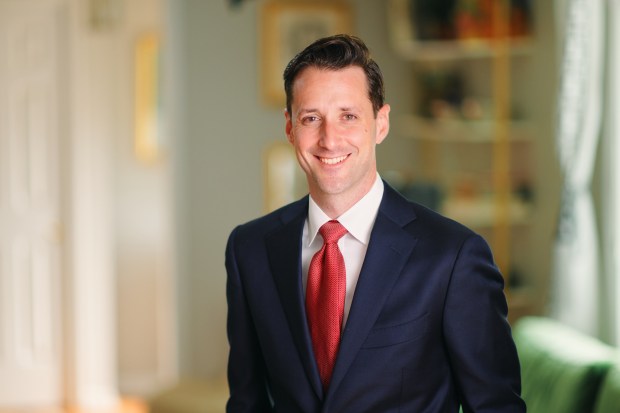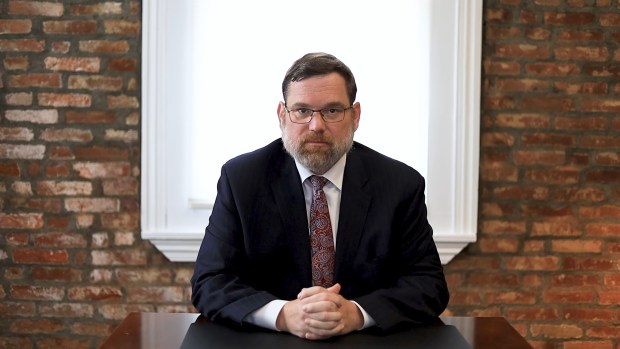Two attorneys are seeking to succeed Deborah Ryan as Chester County District Attorney, the county official whose office is responsible for prosecuting crimes both major and minor.
Democrat Chris deBarrena-Sarobe and Republican Ryan Hyde will be listed on the Nov. 7 ballot, while Ryan, who became the county’s first female and first Democratic district attorney makes a bid for a seat on the county Court of Common Pleas.
Whoever is successful will take over an office that has gone largely unchanged over the years, but which has gained increased importance and scrutiny as the public attitudes towards how the enforcement of laws and attitudes towards criminal prosecution has evolved in the past several years.
The district attorney’s office in Chester County employees dozens of trial prosecutors who handle the felonies and misdemeanor arrest that local and state police refer to it, as well as the more mundane appeals of traffic violations and miscellaneous matters. But it is also responsible for oversight of the Chester County Detectives Office, the law enforcement office that leads or assists in investigations of major felonies in the county.
Over the years, district attorneys have used their position to highlight serious crimes that affect the everyday lives of county residents. As former DA Anthony Sarcione focused his attention of the illegal narcotics trade in the county, Ryan has been outspoken in the need to protect children from physical and sexual abuse.
District attorneys are elected to four years posts. They are paid $191,926 annually.
The candidates were asked to respond to a series of questions. Following are their responses.
Question 1: What would be your top three priorities if elected?
Question 2: How would you describe your leadership style?
Question 3: How do you want the county District Attorney’s Office to be different four years from now?
Question 4: What can be done about the turnover in the office of experienced trial attorneys?

Chris deBarrena-Sarobe
Age: 40
Background: deBarrena-Sarobe is a graduate of the Temple University School of Law. He was a prosecutor in the Chester County District Attorney’s Office, serving as an assistant DA and a deputy DA, from 2001 to 2015. He then served as an assistant U.S. attorney in the U.S. Department of Justice in Delaware until 2022. He is a resident of Willistown.
Website: www.chrisforda.com
Response 1: My top priorities are to first, Concentrate on investigating firearm offenses, including straw purchases offenses, gun trafficking, and the drug dealing that goes along with both of those crimes, to better prevent guns from falling into the hands of violent criminals.
Second, to focus on investigations that protect our children from abuse and neglect. People who choose to abuse children that cannot defend themselves must be brought to justice.
Third, to invest in technology and programming that can enhance law enforcement’s ability to investigate crimes and also help bring communities and police together. We can do this by better accessibility to timely crime data across Chester County, expanding programs for those suffering from addiction and mental illness, and enhancing outreach programs in the community and schools.
Response 2: I learned a lot about myself as a leader while working on complex criminal investigations. But it was a cartel kidnapping case was a true test for everyone on the team that I worked with to make that rescue a success. In that case, we learned that a woman was being held hostage by the Sinaloa Cartel in Culiacan, Mexico. We worked with almost every law enforcement agency in the region and law enforcement in Mexico to save her. The biggest lesson I learned during that investigation was the importance of leading without ego. Leadership is not about always being out front and leading the charge. Often, it is about providing support. It is about asking for help. It is about putting your team in a position to use their strengths and admitting that—even though you might be pretty good at an important task—someone else is better. So, while I have classic leadership traits, like being a strong communicator and staying calm in stressful situations, the key to my success as a prosecutor in a leadership position has been to strategically support my teammates without ego so that we can successfully pursue justice.
Response 3: COVID has had a major impact on the criminal justice system across the country, creating backlogs that take away resources and stressing the drug and mental health treatment communities. My goal is for the District Attorney’s Office to overcome those hurdles and become more impactful in the community in two key ways:
First, the DA’s Office has a unique opportunity to communicate with our community and teach children. I plan to work with our school districts and law enforcement to connect with children and enhance existing programs that keep them safe. Something as simple as talking with our teens in a relatable way with law enforcement about how to have a safe traffic stop cannot just help individuals – it can build trust in the community. As a former federal prosecutor, I have been exposed to a number of outreach programs and I want the DA’s Office to work in partnership with community leaders and elected officials to enhance the programs that already exist.
Second, it is important for people who are charged with low-level crimes due to issues with drugs, alcohol, or mental illness to find paths to treatment as soon as possible. When treatment is successful, it protects the community by reducing recidivism and allows law enforcement resources to be focused on protecting the community from other threats. And while the DA’s Office has recently introduced the LETI program and the commissioners have recently funded a Mobile Mental Health Unit already, I will work with stakeholders in the criminal justice system to identify cases that can be resolved early in the criminal justice process. This will allow the minor offenders to get access to help earlier, enhance the success rate of treatment being provided, and allow police and prosecutors to focus on priority cases.
Response 4: The turnover of prosecutors at local DA’s Offices has always been an issue. When I started at the DA’s Office, I made roughly $46,000 a year and had over $180,000 in law school debt. These salary constraints relative to other legal jobs have always made it difficult to retain prosecutors. In addition the fact that many lawyers can work from home post-COVID while DA’s typically cannot – has become an emerging issue as well. And recently, the DA’s Office has been the victim of its own success – my understanding is that this year at least two prosecutors took the next step in their careers and accepted federal-level jobs.
I have optimism that the DA’s Office will be able to retain attorneys for longer in the near future. The county commissioners rightfully gave a significant salary increase to assistant district attorneys – the starting salary now just over $67,000. Personally, I have a history of teaching at Temple Law School and personal connections at other law schools in the region and plan to recruit heavily from them if elected. And the fact that prosecutors are often leaving for bigger and better things, while tough in the short term, will help attract new skilled prosecutors in the future.

Ryan Hyde
Age: 47
Background: A resident of Uwchlan, Hyde is a graduate of Villanova University School of Law. From 2009 until 2014, he served as a deputy district attorney in Bucks County. Since 2015, he has operated his own law firm, and specializes in representing criminal defendants.
Website: www.ryanhydeforda.com
Response 1: Number one, office stabilization. Addressing the attrition issue in our office is crucial. We must establish a robust pipeline with local law schools to recruit and train top legal talent. Simultaneously, we need to attract experienced lateral hires in the short term to maintain the office’s effectiveness.
Number two, crime reduction through innovation. Chester County has seen a concerning 10 percent annual increase in crime, predominantly property crimes. We’ll focus on employing modern techniques, such as advanced forensic methods like DNA analysis, to improve closure rates. A reinvigorated drug unit and enhanced training for young DAs will also contribute to lowering crime rates.
Number three, community engagement. Implementing community prosecution is essential. This means connecting prosecutors with local police, participating in community events, and fostering a stronger bond with our community. This approach not only reduces the perception of an “ivory tower” but also has been proven to decrease crime and enhance job satisfaction among our Assistant District Attorneys.
Response 2: I would describe my leadership style as “results-oriented.” I firmly believe in hiring capable individuals, providing them with excellent training, and then trusting them to deliver. Micro-management can be counterproductive, and my experience in consulting and the pharmaceutical industry has reinforced the importance of this approach. Trust is paramount, and individuals who fail to perform despite support will be held accountable.
Response 3: Four years from now, I envision the Chester County District Attorney’s Office as being the finest prosecutors office in Pennsylvania. A “Stable and Responsive” office where law enforcement has established contacts within our office, promoting better service to the county. We’ll achieve this by creating a reliable talent pipeline and optimizing file management. Reduced prosecution times will benefit victims, officers, and the community. We must instill trust in our community, ensuring they know we’re dedicated to their well-being, especially in the face of increasing crime rates.
Response 4: To address the turnover issue, we will implement a multi-faceted strategy. First, we’ll establish a robust pipeline for young legal talent and provide comprehensive training. We’ll also focus on redistributing workload to allow attorneys to effectively resolve cases. Cultivating a positive office culture that encourages collaboration and job satisfaction is paramount. Lastly, we’ll actively advocate for fair compensation to prevent experienced attorneys from leaving due to feelings of being set up for failure by management.
This post was originally published on this site be sure to check out more of their content.






